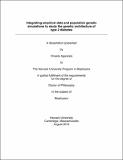Integrating empirical data and population genetic simulations to study the genetic architecture of type 2 diabetes
Author
Metadata
Show full item recordCitation
Agarwala, Vineeta. 2013. Integrating empirical data and population genetic simulations to study the genetic architecture of type 2 diabetes. Doctoral dissertation, Harvard University.Abstract
Most common diseases have substantial heritable components but are characterized by complex inheritance patterns implicating numerous genetic and environmental factors. A longstanding goal of human genetics research is to delineate the genetic architecture of these traits - the number, frequencies, and effect sizes of disease-causing alleles - to inform mapping studies, elucidate mechanisms of disease, and guide development of targeted clinical therapies and diagnostics. Although vast empirical genetic data has now been collected for common diseases, different and contradictory hypotheses have been advocated about features of genetic architecture (e.g., the contribution of rare vs. common variants). Here, we present a framework which combines multiple empirical datasets and simulation studies to enable systematic testing of hypotheses about both global and locus-specific complex trait architecture. We apply this to type 2 diabetes (T2D).Terms of Use
This article is made available under the terms and conditions applicable to Other Posted Material, as set forth at http://nrs.harvard.edu/urn-3:HUL.InstRepos:dash.current.terms-of-use#LAACitable link to this page
http://nrs.harvard.edu/urn-3:HUL.InstRepos:11181075
Collections
- FAS Theses and Dissertations [6136]
Contact administrator regarding this item (to report mistakes or request changes)



